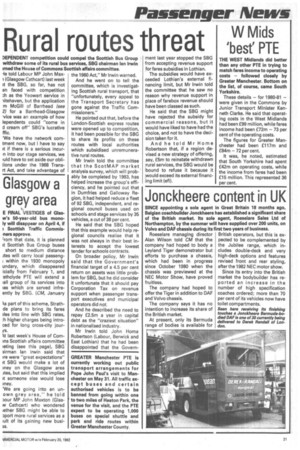Rural routes threat w Mds
Page 15

If you've noticed an error in this article please click here to report it so we can fix it.
'best' PTE
DEPENDENT competition could compel the Scottish Bus Group withdraw some of its rural bus services, SBG chairman Ian Irwin imed the House of Commons Scottish affairs committee.
-le told Labour MP John Max(Glasgow Cathcart) last week it the SBG, so far, has not en faced with competition ,.;.h as the Yeowart service in litehaven, but the application
m McGill of Barrhead (see 2) for a Barrhead-Glasgow vice was an example of how lependents could "come in d cream off" SBG's lucrative ffic.
'We have the network co rntment now, but I have to say it if there is a serious incur n into our stage services, we ruld have to set aside our oblitions under the 1968 Transrt Act, and take advantage of the 1980 Act," Mr Irwin warned.
And he went on to tell the committee, which is investigating Scottish rural transport, that "unfortunately, every appeal to the Transport Secretary has gone against the Traffic Commissioners."
He pointed out that, before the London-Scottish express routes were opened up to competition, it had been possible for the SBG to share its profits on these routes with local authorities which subsidised unremunerative rural routes.
Mr Irwin told the committee that the ScotlVIAP market analysis survey, which will probably be completed by 1983, has helped increase the group's efficiency, and he pointed out that in Dumfries and Galloway Region, it had helped reduce a fleet of 92 SBG, independent, and regional council buses used on schools and stage services by 35 vehicles, a cut of 38 per cent.
He said that the SBG hoped that this example would help regional councils realise that it was not always in their best interests to accept the lowest tender for schools contracts.
On broader policy, Mr Irwin said that the Government's financial target of a 4.5 per cent return on assets was little problem for SBG, but he did consider it unfortunate that it should pay Corporation Tax on revenue support when passenger transport executives and municipal operators did not.
And he described the need to repay £2.5m a year in capital debt as the "craziest situation" in nationalised industry.
Mr Irwin told John Home Robertson (Labour, Berwick and East Lothian) that he had been disappointed that the Govern ment last year stopped the SBG from accepting revenue support for fares subsidies in Lothian. The subsidies would have exceeded Lothian's external financing limit, but Mr Irwin told the committee that he saw no reason why revenue support in place of farebox revenue should have been classed as such.
He said that the SBG might have rejected the subsidy for commercial reasons, but it would have liked to have had the choice, and not to have the decision taken for it.
And he told Mr Home Robertson that, if a region devised a new strategy of offering, say, £5m to reinstate withdrawn rural services, the SBG would be bound to refuse it because it • would exceed its external financing limit (efl).


















































